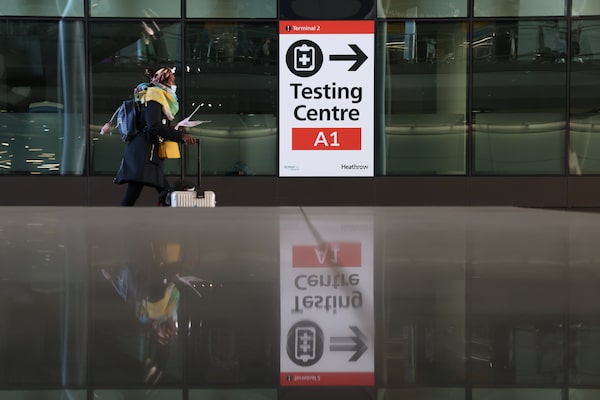
A COVID-19 testing centre sign at Heathrow Airport on Nov. 28, 2021 in London, England.Hollie Adams/Getty Images
The number of Omicron infections in Britain has climbed above 400 but scientists say the actual number is far higher and that travel restrictions have become pointless.
The UK Health Security Agency reported an additional 101 Omicron cases on Tuesday, bringing the national total to 437. However, scientists say the official figure likely underestimates the level of infection because PCR tests only pick up about 30 per cent of the mutation. Those infected with Omicron also have different symptoms from people who have the Delta variant and often appear to have a common cold.
Tim Spector, a professor of genetic epidemiology at King’s College London, said the actual number of infections is probably closer to 1,000 or 2,000. “And we are expecting this to be doubling about every two days at the moment,” Dr. Spector told BBC television.
Travellers returning from Africa say conditions are wretched in Canadian quarantine hotels
To deal with COVID-19 pandemic uncertainty, let’s stop repeating our mistakes
The Omicron variant has been spreading quickly across Europe, and while most scientists agree that it is more contagious than Delta, the actual level of transmissibility remains unclear. It’s also uncertain whether Omicron causes severe illness or if it can evade vaccines.
Britain’s Health Secretary Sajid Javid told the House of Commons on Monday that so far none of the people infected with Omicron had been admitted to hospital.
The new variant emerges as many European countries have already been battling a wave of Delta cases. Omicron has prompted governments to further tighten COVID-19 restrictions.
Austria plans to lift its national lockdown on Sunday but the government said on Tuesday that unvaccinated people will remain under lockdown. France and Poland have closed nightclubs through the holiday season and Poland is introducing mandatory vaccinations for doctors, teachers and security officials. Sweden is introducing new face-mask rules on public transport and urging citizens to renew physical distancing.
Denmark reported 398 cases of Omicron on Tuesday and health officials said the variant had spread across the country. “We now have society-wide infection with the Omicron variant,” the director of the Danish Patient Safety Authority, Anette Lykke Petri, told reporters.
In Scotland, First Minister Nicola Sturgeon said the mutation had been found in nine out of 14 local health regions. That suggested “community transmission is becoming more widespread and possibly more sustained,” Ms. Sturgeon told a news conference on Tuesday. Health officials said Scotland has 99 confirmed cases of Omicron, up 28 from Monday.
The variant has led Britain and many other countries to impose new travel restrictions, especially for people arriving from southern Africa. As of Tuesday, all travellers to Britain must take a COVID-19 test before entering the country and then take a follow-up test two days after their arrival.
Canada also requires travellers from countries other than the United States to take a test upon arrival in addition to a predeparture test. Both Canada and Britain, along with dozens of other countries, have banned foreign travellers from several African countries where Omicron was first detected and have imposed quarantines on returning nationals.
The travel measures have been criticized by the World Health Organization as ineffective and unfair.
“Disease outbreaks are contained at their source, not at their borders,” said Catherine Smallwood, the senior emergency officer at the WHO regional office for Europe. “Travel bans, though they may be easily accessible in terms of political decision-making, are not effective in terms of preventing the spread of disease,” Dr. Smallwood told a media briefing on Tuesday. “They are imposed, they are unfair, they do have economic consequences but most of all they are not effective.”
On Monday, Sarafa Tunji Isola, Nigeria’s high commissioner to Britain, likened Britain’s “red list” of countries as a form of “travel apartheid.”
“What is expected is a global approach, not selective,” Mr. Isola told the BBC. “The travel ban is apartheid in the sense that we are not dealing with an endemic. We are dealing with a pandemic. Whenever we have a challenge there must be collaboration.”
Dr. Spector of King’s College London said that given the rapid spread of Omicron in Britain, the travel restrictions no longer seemed relevant. By his calculations, Britain will soon have more Omicron cases than many of the African countries that are on the government’s “red list.”
“So I think these travel restrictions do perhaps have their place initially, when cases are really low here and really high in the other country, but when we reach that equilibrium, there’s very little point in having them in my opinion,” he said.
Our Morning Update and Evening Update newsletters are written by Globe editors, giving you a concise summary of the day’s most important headlines. Sign up today.
 Paul Waldie
Paul Waldie